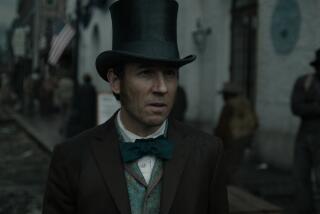‘Angels and Ages’ by Adam Gopnik
Angels and Ages
A Short Book About Darwin,
Lincoln, and Modern Life
Adam Gopnik
Alfred A. Knopf: 224 pp., $24.95
It is an exploration more than a settlement. Adam Gopnik calls his thoughts about Charles Darwin and Abraham Lincoln a “short book.” His aim is not to erect one more edifice upon such grandly built properties but to travel around them, reflecting.
His travel voucher, so to speak, is a proposition: that two great figures, seemingly so different in their achievements, backgrounds and characters, can be linked in the transforming effect each had on their times and times to follow.
Gopnik extends the links to all manner of things: modest demeanors for evolving unshakable purposes, immense ideas argued engagingly from homely particulars, strong family ties, devastating family tragedies. Beyond these, he sees a larger tragedy at the root of their transforming work: universal death as the necessary agent of natural selection; vast death as the agent of emancipation. Some of the links have real joining power; others are more of a straddle. The parts may be more than the whole. But if Gopnik needed the whole to give us the parts (“how can I write still another study of Lincoln or Darwin?” one imagines him thinking), we can be grateful for it.
He starts with an entertaining fact (throughout, he seeks to entertain even as he provokes and, sometimes, moves): Both were born on Feb. 12, 1809. A writer, William Thayer, later proposed an international holiday to commemorate the heroes, respectively, of Justice and Truth. Without the bombast, with a mix of wit, rumination and occasional stylistic pirouettes, Gopnik’s thesis comes close.
In 1809, Gopnik writes in an introduction that brilliantly encapsulates what is to follow, the general opinion had mankind looking warily up to God and loftily down on creation. As for democracy, it was widely seen as a dangerously impractical ideal, breeder of such chaotic violence as the French Terror. By the time of Darwin’s death, it was largely accepted that the world was far older than in the biblical account and that species were naturally mutable, not divinely ordained. And after Lincoln’s terrible but victorious battling, it was accepted that democracy could muster the power to ensure its own order. Fixity was out as an assumption; change, often painfully, was in.
Gopnik writes of Lincoln’s rise from log-cabin manual laborer to upper-middle-class Springfield lawyer. It was, in a way, more of a jump than from Springfield to the White House. It gave him a reverence for law; point-by-point legal reasoning was the ground beneath the bursts of shining eloquence. In one arresting phrase, Gopnik finds the virtue in Lincoln’s shrewd, sometimes chilly political maneuverings: “Winning is the probity of politics.” He compares Darwin’s avidity for minute observation to Lincoln’s passion for legal particulars: “He liked to look at things the way an artist likes to draw . . . the way a cook likes to chop onions.” And out of this -- and out of the deep reflection upon what he saw -- his mighty theories emerged. Each man practiced “the slow crawl of fact” to travel distances. “Snails with sublime purposes are what they both were.”
Darwin feared that his “The Origin of Species” would provoke fierce attacks. In fact its immediate reception ranged from enthusiasm to, at worst, respectful disagreement. Gopnik notes Darwin’s care to frame opposing arguments in their best light; and even to think some up. Psychologically this was disarming: His antagonists could feel recognized. Tactically it forestalled any probing of loopholes.
Gopnik draws vividly characterized personal and intellectual portraits of each man. The material comes from other writers, scrupulously acknowledged, but Gopnik has selected it with a novelist’s skill; and many of the most suggestive reflections are his own. One, for example, concerns Lincoln’s religious faith. For much of his life he was an agnostic. Then, as the horrors of war mounted, along with his own agonized but unflinching resolve to persist with it, his rhetoric referred increasingly to a divine providence. Gopnik compares it to Job’s gaunt, tragic acknowledgment of a harsh and unknowable God: “He found no serenity in the idea that he was doing God’s work. His point in the second inaugural is not that he is doing God’s will but that God’s will is going to be done, no matter what Lincoln does.”
For the most part Gopnik’s writing is pungent, inventive and rich -- sometimes to the point of excess and delighting too much in his play of phrase. Still, why shouldn’t a writer find pleasure in his own skill, perhaps tempering it a little? These are minor flaws, though; the only major one is an epilogue that expatiates windily, even preachily, on ideas that have figured as sharp and shining particularities in the body of the book.
Eder, a former book critic of The Times, was awarded a Pulitzer Prize for criticism in 1987.
More to Read
The biggest entertainment stories
Get our big stories about Hollywood, film, television, music, arts, culture and more right in your inbox as soon as they publish.
You may occasionally receive promotional content from the Los Angeles Times.










